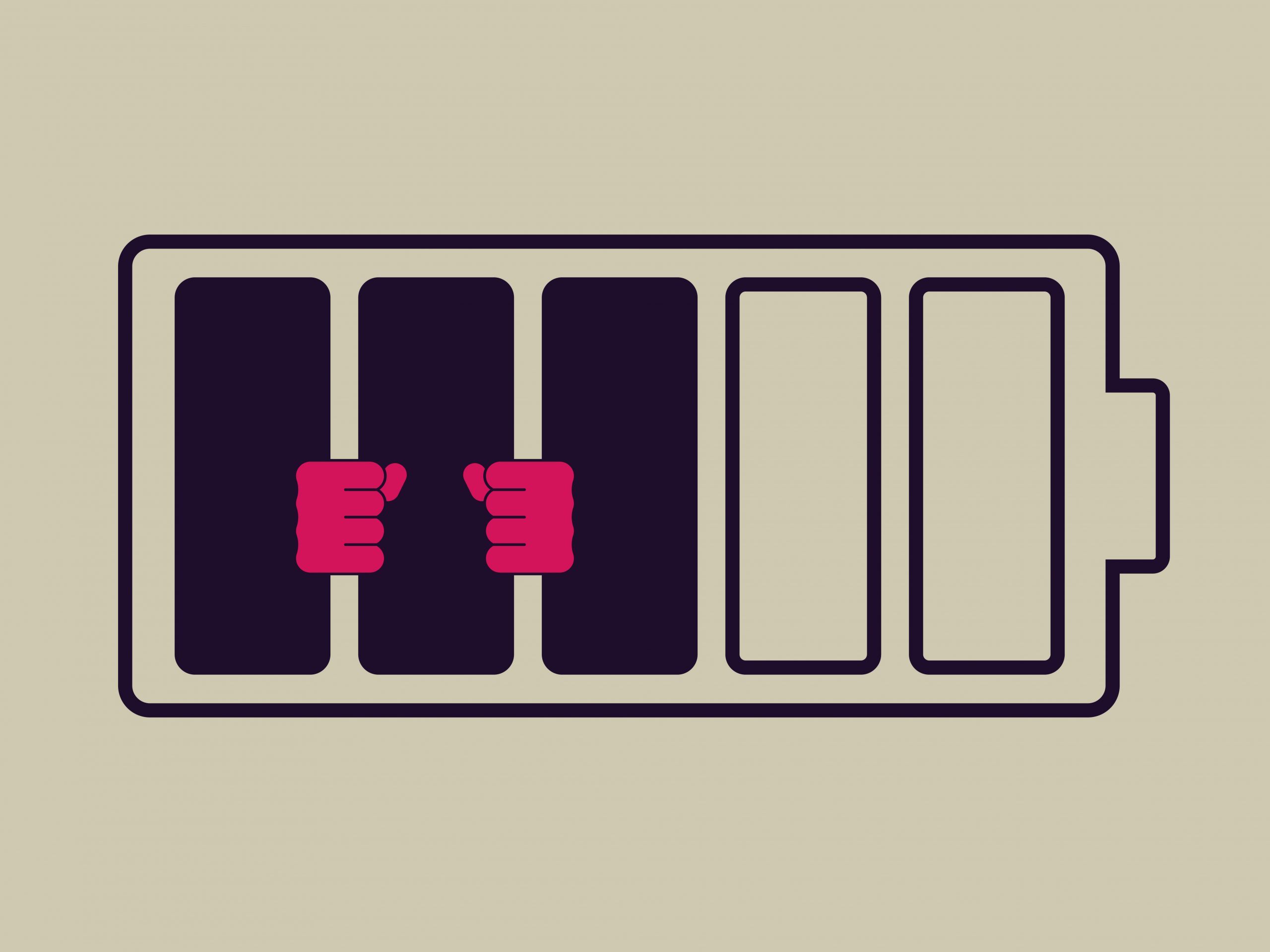Our new technological environment is inescapable, as are the threats it poses.
Breaking the Spell of the Swarm

A cloud of soulless bots has devoured our grandest dreams. How do we live now?
The following is an excerpt from Claremont Institute Executive Editor James Poulos’s forthcoming book Human, Forever: the Digital Politics of Spiritual War. Sign up at humanforever.us to be the first to know when Human, Forever NFTs and sales go live on canonic.xyz.
Americans, and not just Americans, are well aware of how deep the dysfunction of the ruling factions runs. Many older ones remember the abuses of the Intelligence Community and the warnings against the Military-Industrial Complex; they have lived long enough to see the political resistance to the Community and the Complex shift, under pressure of deliberate policies, from the Left to the Right. Many younger ones, the last best hope of the ruling factions because of their smaller and perhaps weaker memories, nevertheless see the shambles of statecraft the way they see all things on social media—as mere trends, mere jokes (intentional or not), or both. The digital triumph disenchanted visual content of its authority as a source of true facts and of pure imagination. The gap between the ostensible supremacy of America and the clownishness and incompetence of the regime can no longer be closed through commercial and communicative propaganda. This attack at the root of the regime’s ability to shape public opinion and otherwise control minds can’t be reversed, or even stopped, by simply politicizing certain beliefs, identities, statements, and actions out of the bounds of the official sphere of life. It goes deeper than politics.
As a result, Americans’ faith is crumbling in the credibility of the regime as the imaginative willpower that determines how fast and in what direction technological advancement should proceed. So too is faith swiftly eroding in the regime’s “private sector” viceroys, the major tech firms whose products and platforms are not at all free-market phenomena but are core components of the strategic geopolitical infrastructure of the Intelligence Community and the Military-Industrial Complex.
None of which is to say that Americans want to destroy these foundational institutions of their current regime. Any country needs at least some spies and soldiers, especially one performing the challenging work of deleveraging untenable and unattractive commitments scattered across what was, at the time of deployment, still a pre-cyborg, in some cases pre-digital world. But Americans are coming to understand that, when it comes to technological innovation and advancement, they are now at the mercy of the governmental organs and franchises the absolute very least subject to the safeguards and limits imposed by the elemental features of their constitutionally guaranteed form of government. The mystique of the garage startup is washing away, less because of anyone’s debunking than on account of its absurdity in the common sense of the people. Technology has advanced to a point where it justifiably seems almost impossible that any truly private-sector person or group of people can innovate for reasons other than those of state—and, specifically, of the extra-constitutional—autocratic—state-within-a-state, conjoined with foreign entities such as Britain’s GCHQ and devoted to the surveillance of the globe and the globalization of security.
Exceptions to this near-certainty that any new technology will be a creature of the Community and the Complex prove the rule. The foremost of these, cryptocurrency, has predictably received sustained and increasing counterpressure from the regime—especially through the framing of climate and crime, although bitcoin is worse than worthless at covering financial tracks and crypto mining is an emissions speck compared to what could be wiped from the carbon ledger with plentiful nuclear energy or an EMP strike (after all, the very future of life on Earth is at stake) against China.
Again, it isn’t that Americans are desperate to save the world by returning China, India, or any other climate villain to the stone age. Quite the contrary—appetites for war are at their lowest in over a century, with no upsurge in sight, even when it comes to the still rather abstract prospect of a merely virtual war. Setting aside conventional conflict, the costs of digital war—speaking of EMPs—are already too insane for ordinary people of the digital age to consider risking or inflicting outside the most extraordinary and existential attacks. The scenario of alarming or unholy biotechnological development in a foreign civilization state is probably the only one that would arouse a real belligerent sensation of a just and urgent responsibility to protect humanity. Few, however, will be prepared to draw that line and cross it, as China’s biotechnological responsibility for the novel coronavirus strongly suggests. It is the sense of the people that the energy and resources needed for the colossal and painful outlays of war in the digital age are better plowed, by themselves as well as others, into the great inward frontiers of online and offline life in the digital age, from secret societies and local governance groups to virtual worlds and space exploration. Thanks to the digital triumph, more than any PR campaign waged against the regime, a critical mass of citizens now simply intuits that the manufacture of crisis after crisis, whether intentionally or half-so, betokens a problem with the regime, not a problem with the world.
GamerFate
The deepening digital sensibility that the world does not, in fact, need to be saved, except perhaps from the ruling factions themselves, comes with it the complementary conviction that what really needs saving, and what is going unsaved, are our souls. This primal and civilized quest for foundational answers to the ultimate questions about the worth and justification of our existence is a major motivator for the shift in rhetoric even among Western leaders from world-saving to soul-saving, visible in every facet of official ethics from BLM to climate to queering justice and well beyond. Yet the digital medium itself reduces these movements to mere memes, one set of more or less arbitrarily curated pieces of content in an evanescent sea of them, in this case defined above all by the fragile fanaticism of the faces and voices jabbering in rote like so many cartoons, deepfakes, or bots created to spam the viewer in the hopes of clawing out mindshare, or at least convincing whichever paymaster that the numbers are trending in the “right” direction. Even boys whiling away the hours under lockdown conditions in front of the infinite scroll of social media come away from the propaganda barrage with, at most, a few mordant lols and a deep-seated impression that those who have come of age through the ruling regime’s rites of passage are generationally distinguished by the mental, cultural, and often physical maladies they share.
Against these tremendous headwinds produced by the existence and experience of people in the digital age, the regime struggles to turn the mightiest resources to decisive advantage. Its efforts to “innovate” only produce stronger backlash and counterforce. To take just one prominent example, the scheme to change politics from distributed representative government to a consolidated system of educators catechizing children from preschool to grad school into a gnostic faith in their and their rulers’ imaginative will appears to be taking over most schools; the feeling, however, is one of the American army sweeping through Iraq and pulling down its statues only to discover that its mission had not at all been accomplished—that it was, in unfolding fact, unaccomplishable. The transformations the regime struggles to implement against the hurricane-force headwinds of the digital triumph are now so severe that they can only destroy the established institutional infrastructure they are supposedly undertaken to save. Major social media platforms are now reduced to paying users outright to generate content worth the few seconds of watch time they’ll receive. The whole concept of social media itself is imploding, as Facebook’s repeated attempts to pivot away from the form and toward finance or entertainment make plain; given that what we call social media is really just televisual technology pushed to its limit, this was inevitable.
Americans may be increasingly shaped by digital technology to look past imagination and commerce toward memory and identity in their sense of what social arrangements will save their souls and those of the ones they love. But this shift intensifies their opposition to having their identities and data expropriated into a universal model built to leverage “permissionless” change onto them through design principles that cannot stay faithful to the human, much less to the normally and naturally human.
Not even ever more engrossing and interoperable gaming metaverses can sweep away the sea change of sensibilities unleashed by the digital triumph. If kids game earlier in life than ever, they often and increasingly burn through games and the gaming lifestyle faster too. While juvenile fixtures of gaming scenes are busted for sexual crimes against tweens—as happened recently to one well-known Fortnite livestreamer—actual juveniles, tomorrow’s First Generation men and women, look back with jaded nostalgia on the mega-game’s simple, brand-free Season One. Now, they see it as it is: just another trash heap of commercial cringe, a sort of graveyard where oversaturated IP goes to die, respawn, die, respawn, die, in the manner of a Hindu who never achieves the degree of enlightenment sufficient to rest in peace.
The future of gaming is exactly not the realm of boundless imagination, meant to model big dreams for real-world application, that it was in the electric age. The rise of so-called alternate reality games, or ARGs, augurs a crash. “Normie” fantasy no longer entertains like it used to, but, across East and West, even extreme or bizarre amusement is chewing people up and making them drop out due to psychological breakdown, boredom, or sensory burnout. “Only by lying down can humans become the measure of all things,” concludes Luo Huazhong, author of the tang ping manifesto. “Burnout arrives when every corner of our lives feels unstable, and we convince ourselves that working all the time is what will fix it. It’s what happens when you feel that catastrophe could be around any corner,” writes one of the most recent autobiographical chroniclers of millennial exhaustion in the US; the video game of social media, is “exhausting,” “continually unsatisfying.” In the digital age, the realization that the imagineering life of chasing dreams has become a scam is expressed in perfectly cyborg terms: “I don’t have the bandwidth to play that game.” Such judgments announce a digital end not only to striver culture but to its putative payoff, entertainment as we knew it. In this sense, the gamified alternate reality of social credit emerging as our would-be form of techno-governance is behind the digital curve. The online swarm-shaping ops inseparable from this system, run by the regime and its allies to orchestrate and remake public opinion, already face increasing fail rates and premature obsolescence. Many are simply abortive and must be frantically recycled, updated, or, like ops in the field, quietly folded up—as the regime’s abruptly and unceremoniously shuttered ARG concerning the 1/6 “insurrection” starkly revealed. Automating this process will not blunt the underlying dynamic.
Despite the frantic efforts of imagineers to queer gaming into a cyborg place more important than reality because of its access to all officially honored identities, gaming under digital conditions returns to something more like the pastime—not an amusement unto death, as the media theorist and culture critic Neil Postman cautioned, but a rite through which the young can with minimal pretension make reflective room to explore the scripts and improvisations of natural human companionship, competition, and communication, and through which in due time they pass out on the other end, where the last passage of childhood, into maturity, awaits.
Live and Let Do
Until that day when the First Generation begins to found the regimes and institutions of the fully digital world, the fate of the current regime will play out. Maybe it will end with a bang or a whisper, or maybe a smattering of bangs and whispers. Either way it will end. No modelable project to reassert its dominion over the world now under digital sway can command sufficient support and arms to gain the degree of social control adequate to its seriously trying. For all its frenetic activity and all the real damage it will do, irreparable and otherwise, it will fail.
The world and all of us in it are under digital sway. We are not by far, even now, under digital control. Certain digital conditions deeply discourage many of us from welcoming or so much as entertaining a posthuman future overswarmed with digitalia. Others have something of an opposite effect. The mystique of digital is strong—stronger even in the absence of soyfaces and magicians pointing, shaking sticks, dancing dances to magnify and celebrate its power. The most arresting vision of the digital swarm acquiring a life of its own, a life over us, is the one aroused by the harsh comparison to human beings that, unlike us, the digital swarm does not need to be alive. Its principles and practices of organization do not put the swarm in need of the tools and totems of identity and community we living, incarnate, ensouled beings need.
And so, even catechized, the bots are ultimately no more than instruments—not wizards, not angels, not demons, not gods, not friends, not lovers. Strange as they are, they are ours—no stranger than, in the end, we are to ourselves. Their portion, not ours, is disenchantment. Even as they defer to our life they look, so to speak, through it, past it, at the nothing and nowhere that is the closest they have to a home. No god has marked them out for preservation, or even favor.
Composed as they are of our symbols, fatefully unlike us, they have no saving symbols of their own.
The American Mind presents a range of perspectives. Views are writers’ own and do not necessarily represent those of The Claremont Institute.
The American Mind is a publication of the Claremont Institute, a non-profit 501(c)(3) organization, dedicated to restoring the principles of the American Founding to their rightful, preeminent authority in our national life. Interested in supporting our work? Gifts to the Claremont Institute are tax-deductible.
Our human need for connection should keep us grounded in reality.
Americans should resist technological subjugation by any means necessary.
Our unruly digital environs are frightening, but they’re better than total bureaucratized control.




